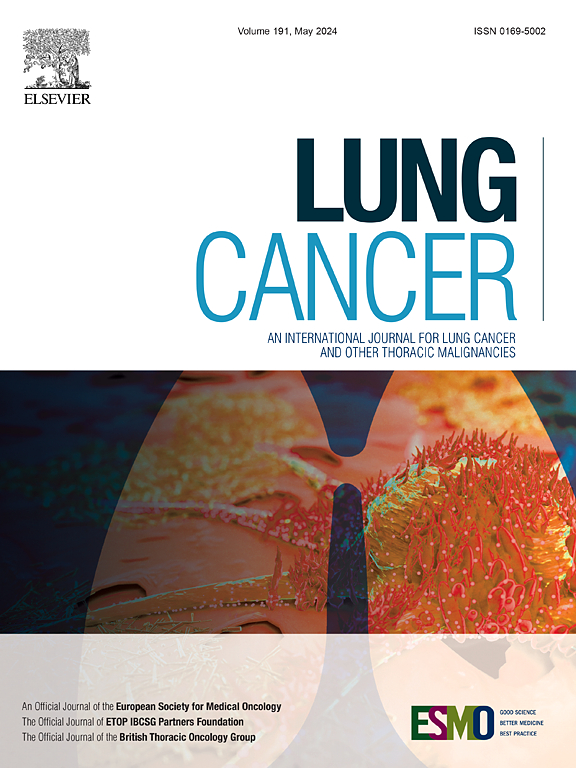利用机器学习识别预测大分期小细胞肺癌化疗免疫治疗疗效的关键基因特征。
IF 4.5
2区 医学
Q1 ONCOLOGY
引用次数: 0
摘要
缺乏明确的生物标志物对广泛期小细胞肺癌(ES-SCLC)的化学免疫治疗提出了重大挑战。我们旨在通过机器学习(ML)的综合基因表达分析,确定与ES-SCLC化疗免疫治疗疗效相关的关键基因。方法:对接受一线化疗免疫治疗的ES-SCLC患者进行前瞻性多中心队列分析。对肿瘤样本进行RNA测序以评估基因表达水平。应用ML技术鉴定与治疗疗效相关的关键基因特征。然后使用nCounter系统开发并验证了一组基因,并评估了该模型在预测180天无进展生存期(PFS)方面的性能。结果:共纳入93例患者。基于ml的基因选择从综合的基因表达数据中鉴定出包含83个基因的基因集。利用这些基因开发了一个nCounter面板,并基于它们的表达水平开发了ML模型。在验证集中,该模型的准确率为0.93,精密度为1.00,真阳性率为0.83,真阴性率为1.00。结论:这些发现为ES-SCLC的生物标志物开发提供了基础,并突出了该方法在临床实践中作为一种经济、简单、快速评估治疗效果的工具的潜力。本文章由计算机程序翻译,如有差异,请以英文原文为准。
Identification of key gene signatures for predicting chemo-immunotherapy efficacy in extensive-stage small-cell lung cancer using machine learning
Objectives
The lack of definitive biomarkers presents a significant challenge for chemo-immunotherapy in extensive-stage small-cell lung cancer (ES-SCLC). We aimed to identify key genes associated with chemo-immunotherapy efficacy in ES-SCLC through comprehensive gene expression analysis using machine learning (ML).
Methods
A prospective multicenter cohort of patients with ES-SCLC who received first-line chemo-immunotherapy was analyzed. RNA sequencing was performed on tumor samples to assess gene expression levels. ML techniques were applied to identify key gene features associated with treatment efficacy. A panel of genes was then developed and validated using the nCounter system, and the model’s performance in predicting 180-day progression-free survival (PFS) was evaluated.
Results
A total of 93 patients were included in the analysis. ML-based gene selection identified a gene set comprising 83 genes from the comprehensive gene expression data. An nCounter panel was developed using these genes, and an ML model was developed based on their expression levels. In the validation set, the model achieved an accuracy of 0.93, precision of 1.00, a true positive rate of 0.83, and a true negative rate of 1.00. PFS was significantly longer in the high-efficacy group than in the low-efficacy group in the validation set (P < 0.001).
Conclusions
These findings provide a foundation for biomarker development in ES-SCLC and highlight the potential of this method as a cost-effective, simple, and rapid tool for assessing treatment efficacy in clinical practice.
求助全文
通过发布文献求助,成功后即可免费获取论文全文。
去求助
来源期刊

Lung Cancer
医学-呼吸系统
CiteScore
9.40
自引率
3.80%
发文量
407
审稿时长
25 days
期刊介绍:
Lung Cancer is an international publication covering the clinical, translational and basic science of malignancies of the lung and chest region.Original research articles, early reports, review articles, editorials and correspondence covering the prevention, epidemiology and etiology, basic biology, pathology, clinical assessment, surgery, chemotherapy, radiotherapy, combined treatment modalities, other treatment modalities and outcomes of lung cancer are welcome.
 求助内容:
求助内容: 应助结果提醒方式:
应助结果提醒方式:


